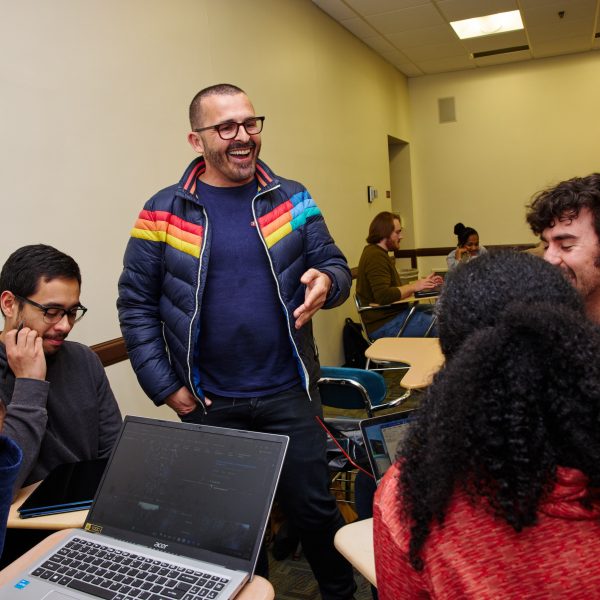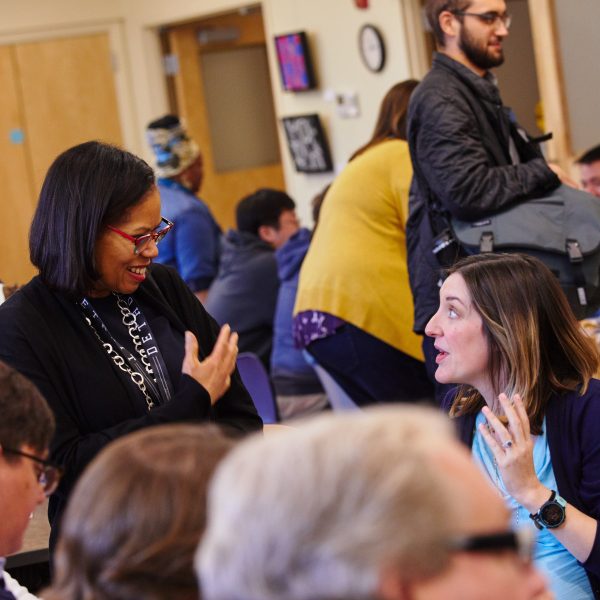Track 3: Homiletics
The PhD in Practical Theology
Homiletics Concentration
Homiletics at BUSTH is a contextual, theological discipline. Homiletics is a practical-theological study of preaching in that it is self-consciously contextual and interdisciplinary in nature. Homiletics is also more broadly theological in the sense that it draws on the best of constructive theology, Biblical studies, and liturgical studies to do its work. Uncommon strengths in all these critical theological resources make BU a great place to do research into preaching’s practice, theories, and diverse contexts. They are what make the homiletics concentration at BU one of the leading programs in North America for pursuing a PhD in the field—and at a world-class research university.
The history of the institution plays no small part in this theological orientation. Boston University School of Theology (BUSTH) has been the place where many significant scholars have launched careers of teaching and research in preaching. Homileticians like Samuel Proctor, Isaac Clark, Richard Eslinger, Evans Crawford, David Randolph, and Bobby McClain received their doctorates here. The School of Theology has also welcomed an inordinate share of North America’s great preachers. Preachers like Martin Luther King, Jr., Anna Howard Shaw, and Howard Thurman continue to animate the work of collections, centers, programs, and research projects in this place among faculty and students alike. All this makes BUSTH a rich place to pursue excellence in the theological discipline that is homiletics.
Going forward, doctoral students in the homiletics concentration can take advantage of opportunities with new research in homiletics in connection with concentration advisor, Dr. David Schnasa Jacobsen. The Homiletical Theology Project (HTP) sponsors the Consultation on Homiletical Theology and has led to several published works in the four-volume series The Promise of Homiletical Theology. Future publishable work of HTP includes consultation studies of intercultural communication theory for homiletical pedagogy and a project that deals with the problem of Christian proclamation of the Hebrew Bible—all of which have included research opportunities for STH PhD students in the homiletics concentration. Beyond that, HTP webinars and Zoom events allow doctoral students to converse and connect with leading figures in the field across North America. Students can also take part in occasional special research opportunities provided by the Center for Practical Theology, for example, the Consultation on Preaching and Postcolonial Theology.
PhD students can benefit from resources of the Boston Theological Institute and may on occasion include BTI coursework with advisor approval. Boston University is a vibrant place for advanced studies in practical theology and homiletics with an established doctoral program, strong faculty, and the resources and on-the-ground research projects of the Center for Practical Theology. The PhD program in Practical Theology/Homiletics aims to prepare excellent scholars and teachers of preaching who will go out to serve in leadership in universities, seminaries and divinity schools, and faith communities.
Program Requirements:
- 3 Core Courses in Practical Theology (12 credits)
- Proseminar in Practical Theology
- Advanced Research in Practical Theology
- Ecclesiology (or alternate doctoral seminar in theology, approved by advisors
- 7 Concentration Courses in Homiletics (28 credits), approved by the advisor. Courses include three required courses in bold and several elective possibilities:
- Theologies of Preaching (900-level)
- Preaching and Worship in the African American Traditions
- Homiletical Options
- Prophetic Preaching
- Parish Preaching
- Identity, Preaching, and Leadership in Post-Colonial Contexts
- Narrative Sermons
- Preaching Apocalyptic Texts
- Situational Preaching (900-level)
- History of Preaching (TBA)
- Tailored Reading Courses in Homiletics with Dr. Jacobsen
Qualifying Examinations
PhD students in the homiletics concentration take three written exams and one oral. These examinations consist of:
- Practical Theology Exam
- Theology of Preaching, Church, and Context Exam
- Homiletic Theory, Hermeneutics, and Student Special Research Area Exam
- Oral Exam for Review and Anticipated Dissertation Prospectus
All of the exams involve some core bibliography but are always tailored to students’ research interests—especially exam #3.
Admissions Requirements
Admission to the PhD program is competitive and highly selective. A master’s degree in theology is required. The application also requires a clear statement of research interests, transcripts, writing sample, three letters of recommendation, and an interview. Potential applicants are strongly encouraged to contact Dr. Jacobsen early in the process to discuss research interests and program details. For further information about the admissions process, please also contact the Admissions Office.
Related Faculty
Faculty support for the program extends to colleagues in homiletics and related disciplines. Below is a listing of faculty whose expertise is available to help students with one or more of the seven concentration courses that along with the required courses in practical theology make up the coursework part of the PhD.
- Dr. David Schnasa Jacobsen (expertise in preaching, homiletic theory, theology of preaching, homiletical analysis, homiletical exegesis, situational preaching, homiletical-theological method, Word and Sacrament, Christian scriptures),
- Dr. Teddy Hickman-Maynard (expertise in Black Church Studies, critical race theory, evangelism and culture, justice and prophetic/priestly ministry)
- Dr. Robert Allan Hill (expertise in New Testament, preaching, pastoral ministry, Johannine literature),
- Dr. Karen B. Westerfield Tucker (expertise in North American liturgical history and theology, Methodist/Wesleyan liturgical history and theology, hymnology, sacramental theology),
Other BUSTH faculty colleagues offer electives, which, with advisor approval, can count toward one or two concentration requirements. Below are some examples of faculty colleagues who are especially poised to work with homiletics PhD students in related areas, disciplines, and theoretical orientations:
- Dr. Shively Smith (expertise in New Testament, ancient rhetoric, metaphor, theories of biblical hermeneutics, African American and Womanist hermeneutics)
- Dr. Shelly Rambo (expertise in constructive theology, trauma, feminist theory and theology, postmodern theology, theological imagination),
- Rebecca Copeland (expertise in eco-theology, constructive theology, revisionist Christology, anthropocentrism, and hermeneutics).



